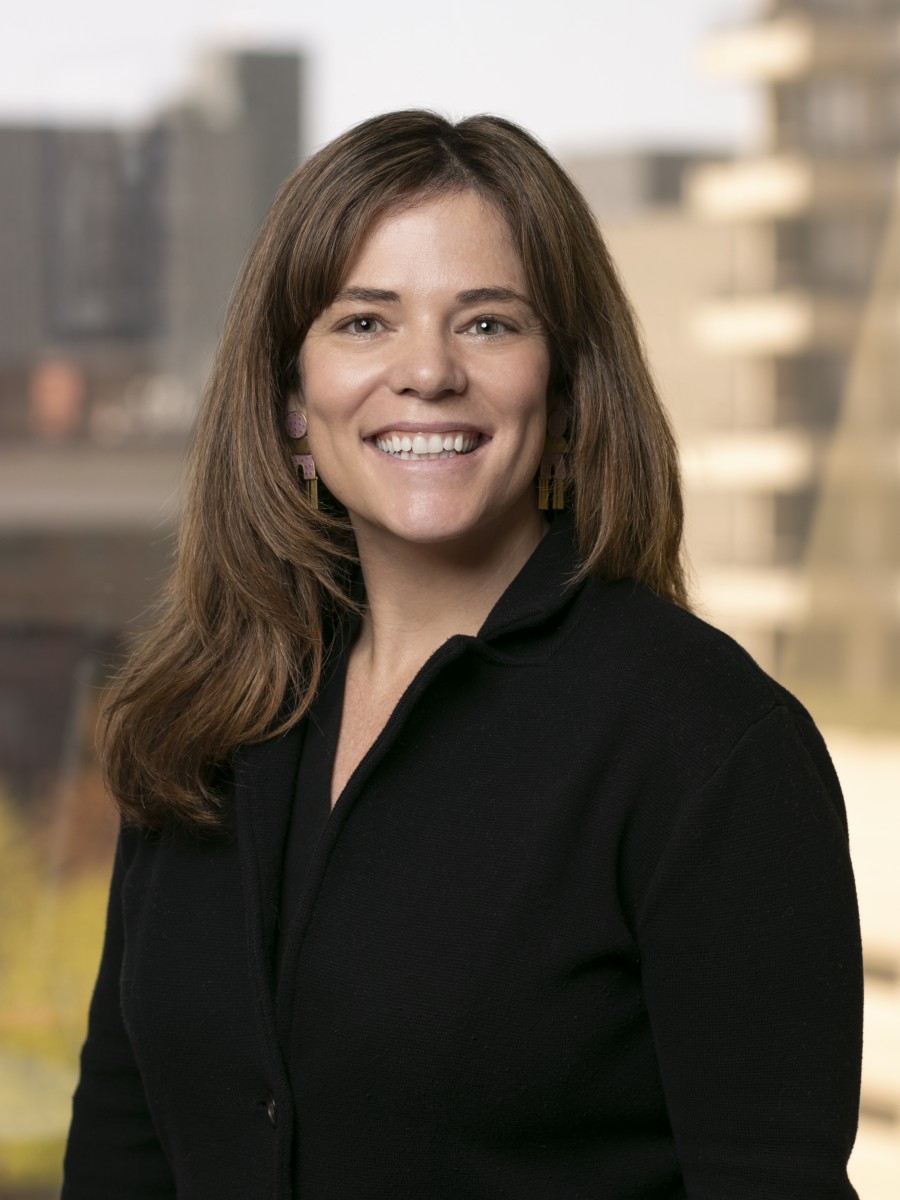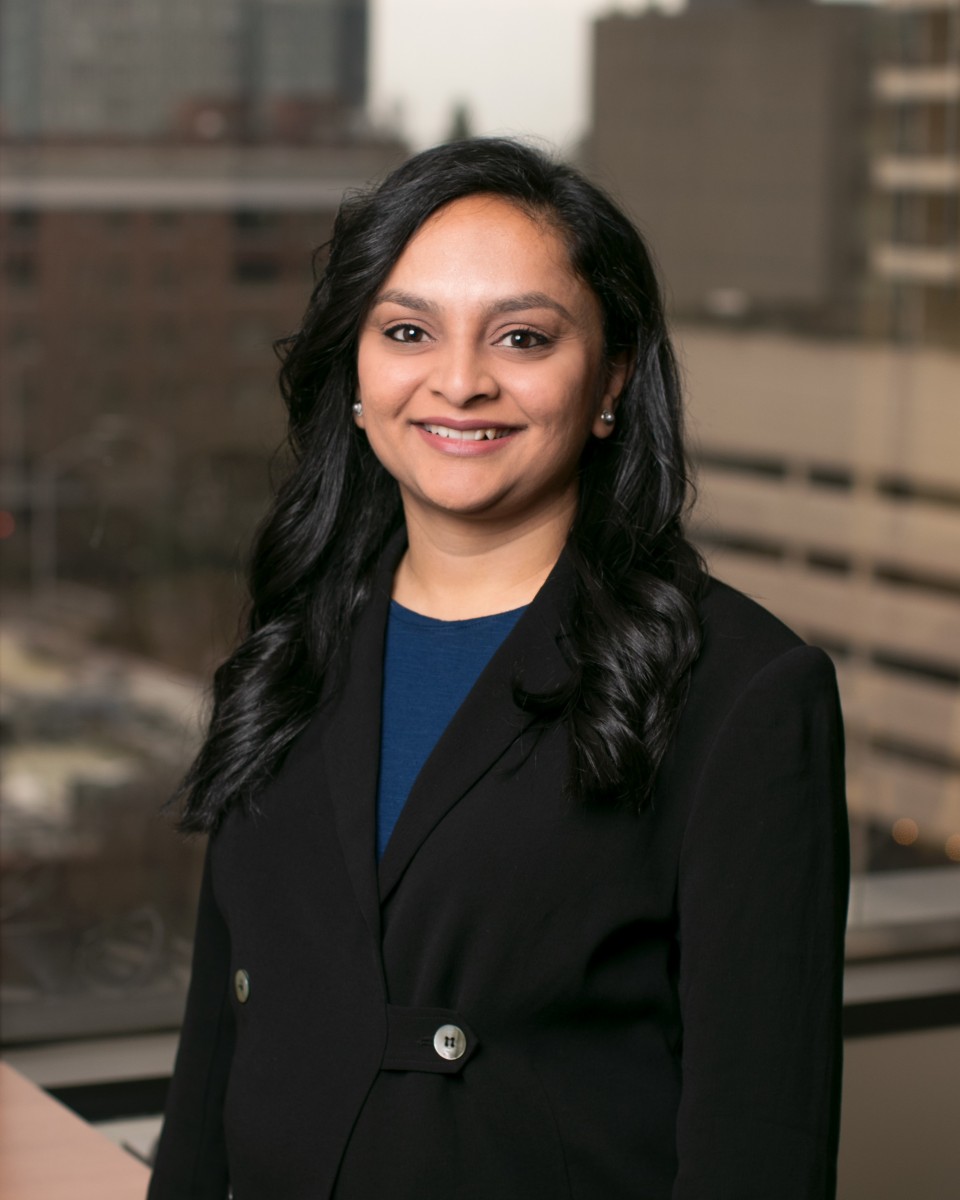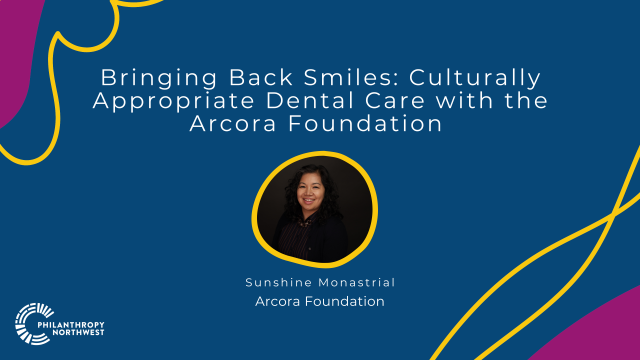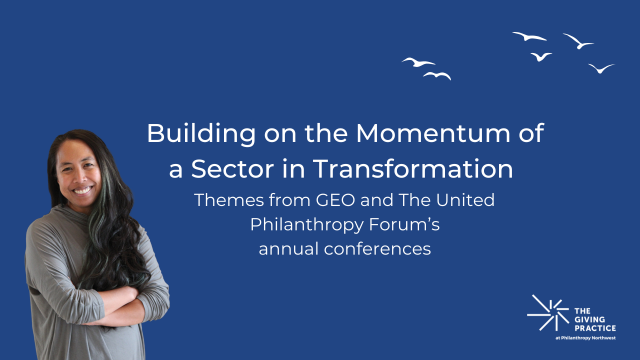
Philanthropy Northwest, alongside our network, has incredible potential to address and help solve today’s societal issues that stem from historical and ongoing inequities and oppression to fulfill a vision of a healthy, vibrant and sustainable future for our communities. We know that we cannot do this alone. We must build and nurture an ecosystem that addresses equity at every level – personal, interpersonal, institutional and structural. For us, this ecosystem — where there is a strong culture of belonging — is rooted in our diversity, equity and inclusion (DEI) values, strategy and actions.
As the year ends, two of our staff, Erin and Ankita, who also lead Philanthropy Northwest’s staff DEI advisory committee, share their personal and interpersonal lessons and perspectives on how to continue working in ways that center equity.
Erin, vice president, people & culture:
 As a white, cisgender, hetero, middle-class woman, I am committed to cultivating and stewarding a culture of belonging at Philanthropy Northwest. Not only because it is my role as the lead of people and culture within the organization, but also because it is my personal mission to create and sustain the conditions within organizations for all people to thrive. In doing so, I realize that my privilege often blinds me to the barriers that persist for this to be readily possible for people, especially in our current political climate that is literally telling people they don’t belong, and in the workplace, where we continue to value white dominant cultural norms and behaviors. To combat this blind spot, I must consistently remind myself to lead with this awareness, willingness and skill to disrupt it rather than reinforce it. This means we, especially those of us who are of the dominant culture and hold positional power, need to take feedback consistently, listen carefully, understand how our white fragility shows up, step up when we need to undermine white supremacy and step back to follow the folks with lived experience to lead on important matters of our time.
As a white, cisgender, hetero, middle-class woman, I am committed to cultivating and stewarding a culture of belonging at Philanthropy Northwest. Not only because it is my role as the lead of people and culture within the organization, but also because it is my personal mission to create and sustain the conditions within organizations for all people to thrive. In doing so, I realize that my privilege often blinds me to the barriers that persist for this to be readily possible for people, especially in our current political climate that is literally telling people they don’t belong, and in the workplace, where we continue to value white dominant cultural norms and behaviors. To combat this blind spot, I must consistently remind myself to lead with this awareness, willingness and skill to disrupt it rather than reinforce it. This means we, especially those of us who are of the dominant culture and hold positional power, need to take feedback consistently, listen carefully, understand how our white fragility shows up, step up when we need to undermine white supremacy and step back to follow the folks with lived experience to lead on important matters of our time.
Building skills to disrupt and undermine racism/oppression. We are working to build skills and an organizational norm and practice of radical candor, where all employees are encouraged to give real time feedback to each other in a variety of ways – whether through individual or one-on-one feedback, including thoughts in surveys or through organization-wide conversations about racial equity. Just a few months ago I stood in front of our 25 person staff “educating” them on issues I have no lived experience with and did not take into consideration the voices and approach of those who have lived experiences. After this event, my colleague shared the deep impact of my actions on her and her community. I had unintentionally reinforced the system that I was trying to change. My intention was good, but my impact was harmful to the exact community I was trying to be more inclusive of. This was a powerful lesson for me of how to share power by stepping back and listening to the voices most impacted.
Doing more by slowing down. I’ve also learned that this work takes time and requires quality not quantity. I’ve had many situations where my sense of urgency gets the better of me and I move too quickly with activities that require much more time and space. In my haste to move the needle on things, I’ve again left out the voices closest to the issues, and at times underappreciated the nuance and complexity in this work by trying to overly simplify to accommodate my [and others’] whiteness. This is also one example of how my white fragility shows up.
Ankita, senior manager, public policy & advocacy:
 After over a decade of working within and with community-based organizations and community leaders across the state, I joined Philanthropy Northwest about a year ago. I was already present to and aware of the conversations about racial equity that the sector faced and had thoughtful conversations within my personal network about my role and impact in this ecosystem. As I continue to create relationships, deepen conversations centering equity and advocate for accountability within this philanthropic ecosystem, there have been moments of revelations and questions that have been shaping and impacting my work.
After over a decade of working within and with community-based organizations and community leaders across the state, I joined Philanthropy Northwest about a year ago. I was already present to and aware of the conversations about racial equity that the sector faced and had thoughtful conversations within my personal network about my role and impact in this ecosystem. As I continue to create relationships, deepen conversations centering equity and advocate for accountability within this philanthropic ecosystem, there have been moments of revelations and questions that have been shaping and impacting my work.
Perceived power and privilege IS power and privilege. When I joined Philanthropy Northwest, I had to quickly organize philanthropic efforts and work in close proximity with community leaders. Even though I am an immigrant woman of color and worked within the nonprofit space for over a decade, I had moments of confusion when I was viewed by my community as being part of philanthropy and not part of the community. I remember feeling, “Wait, am I or am I not part of this community?!” I started reflecting about the interplay between my personal identity and institutional positioning and impact. To be at Philanthropy Northwest means that I get to belong to the community more responsibly, belong to philanthropy more wholly, and be present to, question and influence personal and institutional power or lack thereof.
Navigating dynamic complexities. Many communities are directly and exponentially impacted by inequities, discrimination and oppression. I belong to some of these communities and I am constantly learning and growing as an ally to others. At any given time, I must have a nuanced evaluation of my ethics on when and how I am using my voice, lived experiences, time, relationships and resources to deepen our work meaningfully. There are times when speaking truth to power has been deeply meaningful and impactful, and other times when it takes slow, deliberate efforts to earn trust and rely on the generational wisdom of communities to transform our ecosystem.
Our identities and positions allow us to work within the philanthropic ecosystem and beyond to question, change and transform actions and practices that shape a vibrant and healthy future for us all. We think it is important to come at this work in close collaboration and partnership with each other wholly in our identities. We recognize that there is a power differential between us, not only in our titles and positional authorities, but also the privilege that whiteness affords one of us. Before we move into action and transformation on the organizational level and intersectional movement building on the structural level, we need to counter act these power dynamics through deep awareness and authenticity on a personal level as well as kindness, trust and relationship on an interpersonal level.
Philanthropy Northwest is on a path where our staff are more inspired, curious and connected to centering equity as we continue to support and build our ecosystem and our future. We will not do this alone, and are excited to do this with our members, partners and communities. We ask each of you - how are you showing up personally and with each other in this ecosystem? And how will it move our sector to creating a more equitable space for us to do our work together?


